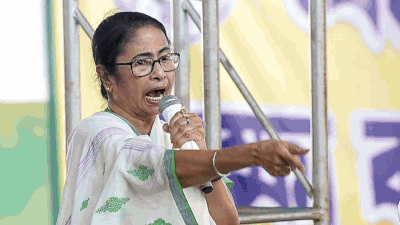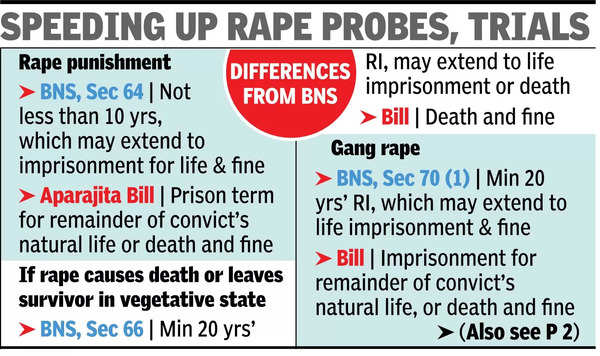Bengal’s Aparajita Bill, with death for rape, set to be tabled in House today | Kolkata News


KOLKATA: MLAs on Monday got a draft copy of the Aparajita Bill, which seeks to punish all incidents of rape – including cases where the woman survives – with death or life in prison. State law minister Moloy Ghatak is likely to table the Aparajita Women, Child (West Bengal Criminal Law Amendment) Bill 2024 in the assembly on Tuesday.
The bill will seek to amend the Bharatiya Nyaya Sanhita and the Bharatiya Nagarik Suraksha Sanhita as well as parts of the Pocso Act of 2012 and introduce the death penalty in several types of sexual assault cases irrespective of the victim’s age.
BNS Section 64, now in force, punishes rape with prison terms from 10 years to life. BNS Section 66 has the death penalty for rape and murder and rapes where survivors exist in a vegetative state though this section also allows for a 20-year prison term or life imprisonment. The Aparajita Bill will seek that these crimes are punished only with death. The bill will also seek death for gang rapes [BNS Section 70(1)].
The Aparajita Bill will also ask for longer prison terms for disclosing a rape survivor’s identity (three to five years instead of the BNS punishment of two years). It proposes to make “printing or publishing any matter regarding court proceedings without permission” punishable with three to five years in jail, from the maximum two years in BNS.

Acid attacks, too, can get a life imprisonment.
The bill that state law minister Ghatak is set to place seeks to amend BNSS provisions to speed up rape probes and trials (probes from the BNSS deadline of two months to only three weeks and, if needed, an additional 15 days). It says trials in all sex crimes and acid attacks have to be completed within 30 days.
The passage of the bill should be smooth, given that the Trinamool has the support of 223 MLAs in the 294-member state assembly. BJP legislators did not indicate on monday whether they would support the bill or abstain during voting.
But law is on the concurrent list, which means the bill will need nods from both the state governor and the president; and precedences show how difficult this can be. The Andhra Pradesh Disha Bill of 2019 and the Maharashtra Shakti Bill of 2020 had only one penalty – mandatory death – for all rape and gang-rape cases. Both were passed unanimously by the state legislatures; but neither has got presidential assent till date.



